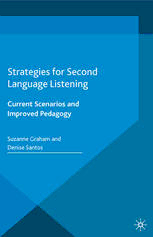
Strategies for Second Language Listening: Current Scenarios and Improved Pedagogy PDF
Preview Strategies for Second Language Listening: Current Scenarios and Improved Pedagogy
Strategies for Second Language Listening Also by Suzanne Graham EFFECTIVE LANGUAGE LEARNING Positive Strategies for Advanced Level Language Learning IMPROVING FOREIGN LANGUAGE TEACHING Towards a Research-based Curriculum and Pedagogy (co-authored) OBJECTIF BAC 2 (co-authored) Strategies for Second Language Listening Current Scenarios and Improved Pedagogy Suzanne Graham University of Reading, UK and Denise Santos Independent Scholar, UK © Suzanne Graham and Denise Santos 2015 Softcover reprint of the hardcover 1st edition 2015 978-1-137-41051-1 All rights reserved. No reproduction, copy or transmission of this publication may be made without written permission. No portion of this publication may be reproduced, copied or transmitted save with written permission or in accordance with the provisions of the Copyright, Designs and Patents Act 1988, or under the terms of any licence permitting limited copying issued by the Copyright Licensing Agency, Saffron House, 6–10 Kirby Street, London EC1N 8TS. Any person who does any unauthorized act in relation to this publication may be liable to criminal prosecution and civil claims for damages. The authors have asserted their rights to be identifi ed as the authors of this work in accordance with the Copyright, Designs and Patents Act 1988. First published 2015 by PALGRAVE MACMILLAN Palgrave Macmillan in the UK is an imprint of Macmillan Publishers Limited, registered in England, company number 785998, of Houndmills, Basingstoke, Hampshire RG21 6XS. Palgrave Macmillan in the US is a division of St Martin’s Press LLC, 175 Fifth Avenue, New York, NY 10010. Palgrave Macmillan is the global academic imprint of the above companies and has companies and representatives throughout the world. Palgrave® and Macmillan® are registered trademarks in the United States, the United Kingdom, Europe and other countries. ISBN 978-1-349-57331-8 ISBN 978-1-137-41052-8 (eBook) DOI 10.1057/9781137410528 This book is printed on paper suitable for recycling and made from fully managed and sustained forest sources. Logging, pulping and manufacturing processes are expected to conform to the environmental regulations of the country of origin. A catalogue record for this book is available from the British Library. Library of Congress Cataloging-in-Publication Data Graham, Suzanne, 1963– Strategies for second language listening : current scenarios and improved pedagogy / Suzanne Graham, University of Reading, UK ; Denise Santos, Independent Scholar. pages cm Summary: “Listening is generally perceived as a diffi cult and sometimes neglected skill by language teachers and learners. This volume aims to help second language teachers to teach listening in a principled way. It provides a detailed overview of research into effective second language listening and offers insight into the role of learner strategies. The book also examines teachers’ beliefs and practices regarding listening and listening pedagogy, providing an analysis of textbook materials for second language listening. With suggested practical activities for the teaching of listening as a process, not a product, the book is an invaluable resource for the development of more effective listening, and will appeal to researchers and practitioners of second language learning alike”— Provided by publisher. 1. Language and languages—Study and teaching. 2. Second language acquisition—Study and teaching. 3. Listening comprehension. 4. Listening—Ability testing. I. Santos, Denise, 1963- author. II. Title. PE1128.A2G676 2015 418.0071—dc23 2015019850 Typeset by MPS Limited, Chennai, India. To our parents This page intentionally left blank Contents List of Figures and Tables x Acknowledgements xi Glossary xii Introduction: ‘Doing’ Listening or ‘Teaching’ Listening? 1 Rationale for this book 1 Structure of the book 4 How to use this book 4 A fi nal point on terminology 5 Part I Key Issues in the Teaching of Listening 1 Key Issues in Listening Pedagogy in the Second Language Classroom 9 Introduction 9 Key issues guiding the teaching of listening 10 Chapter summary 20 2 The Role of Learner Strategies in Second Language Listening 22 Introduction 22 Defi nitions 22 What do strategies involve? 23 Using strategies effectively 24 Learner strategies, motivation and self-effi cacy 26 Different kinds of strategies 27 Strategies in action 30 Exploring strategies in more depth 32 Prediction-based strategies and advance organisers 32 Prediction and verifi cation/monitoring 34 Problematising ‘focusing’ strategies further 35 Inferencing 37 The relationship between strategy use and linguistic knowledge 38 Chapter summary 39 3 Teaching Listening Strategies in the Second Language Classroom 41 Introduction 41 Can we teach listening strategies? Should we? 41 Models of strategy instruction 42 vii viii Contents Examples of interventions to teach listening strategies 43 Do all learners benefi t from listening strategy instruction? 48 Insuffi cient practice 49 Needs-based strategy instruction and feedback on strategy use 49 Chapter summary 51 Part I summary 51 Part II How Listening Is Taught 4 What Teachers in England Say and Do about Second Language Listening 55 Introduction 55 Our project: setting the context 56 Teachers’ beliefs about listening and what they claim to do in the classroom 58 Listening in practice: observations and interviews 62 Observations 62 Interviews 82 Chapter summary 95 5 How Textbooks Approach Listening 96 Listening in language teaching materials: empirical fi ndings 97 Our project: what we wanted to explore, and why 98 The sample 100 Procedures 100 Frequency of listening tasks 103 Listening and other skills 105 Characteristics of the listening passages 106 Listening tasks 113 Commentaries in the Teacher’s Book: focus on strategies? 116 To what extent do Teacher’s Books consider metacognition in listening? 119 Chapter summary 121 Part II summary 121 Part III Pedagogical Applications 6 Pedagogical Applications 125 Introduction 125 Awareness-raising: how learners listen and how they can listen more effectively 127 Prediction and verification/monitoring 134 Listening for gist and identifying key words 138 Understanding key sounds 144 Segmenting chunks of language 148 Understanding and adapting existing listening materials 154 Giving feedback on listening 162 Contents ix Conclusion: from Current Scenarios to Improved Pedagogy 170 Appendices 173 References 175 Annotated Bibliography 182 Index 185
